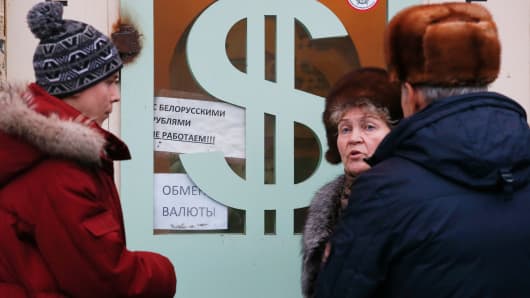The fall of the Russian ruble portends rough seas ahead for multinational corporates. It is the kind of crisis that will separate the effective risk managers from the rest — rewarding those corporates that can manage through intense volatility, and punishing those that can't.
Sanctions have cut off Russia's access to foreign capital at the same time that falling oil prices (down almost half from their 2014 peak) make that access even more essential – so Russia can refinance its debt.
Read MoreThe collapse of Russia in 3 charts
The ruble's slide picked up speed at the end of November and intensified this week. Intended to mollify markets, Russia's rate hike to 17 percent had the opposite effect, accelerating the run on the ruble. While the rate hike itself wasn't particularly surprising – the central bank has been raising interest rates – its size, and its timing, did send the message "We're in trouble."
The downward spiral of the Russian ruble has exacerbated global currency volatility and it has a contagion effect. For example, the combination of a falling ruble and Japanese Prime Minister Shinzo Abe's re-election will likely re-embolden Abe's commitment to devalue the yen. The threat of a race-to-the-bottom, beggar-thy-neighbor currency war is very real.
The contagion also exposes continuous fundamental weaknesses in global markets. Structural weaknesses in the euro zone, for instance, portend further declines for the euro. According to Deutsche Bank, the euro should be heading to 1.16 to the U.S. dollar based on the current trend in the price of oil and economic fundamentals in Europe – that is 6.5 percent lower than where the euro is today.
Like 1998—but worse
A key move Russia could and should make to aid in stopping the ruble's free fall is to work with the Ukrainian government to end the conflict there, so that the U.S. and Europe would lift sanctions. If Russia doesn't come to the table – and soon – then we will likely see a repeat of the 1998 collapse of Russia's economy. This time, it would be worse. Russia's 1998 default hit investors hard, and that memory is still fresh, so it will be far more difficult this time for Russia to entice foreign capital – no matter where the interest rate is set.
The ruble's fall will hit hard the earnings of multinationals doing business in Russia. As an example of the losses that multinational corporations could face in Russia – and the uncertainty that still remains about the future of the ruble and the Russian economy – Apple halted all online sales in Russia on Tuesday. The company attempted to keep pace with the ruble's fall, increasing prices by 25 percent in November, but gave up the effort this week as the ruble's fall continued to erode the value of Apple's sales.
Read MoreCashin: This is not 1998 all over again
In talking with the CFO of a multinational company with 4 billion euros (US$4.93 billion) in revenue, his company lost at least 200 million euros as the ruble slid, but he was most worried about how much more they had lost that he didn't yet know about. Because this CFO doesn't have visibility into his ruble risk, he can't manage expectations with his CEO and board around how the company should expect to be impacted by the ruble's fall. "200 million euros – or worse" is not the kind of uncertain answer that a CEO or board wants to hear.
The implications of the ruble's slide extend to other central banks as well. The ruble crisis has made Federal Reserve Chair Janet Yellen's job more difficult. It's still unclear what impact the ruble's slide and its spreading contagion will have on a strengthening U.S. economy.
In the aftermath of a crisis, people tend to scrutinize the effectiveness (or lack thereof) of risk-management controls that corporates had in place. Currency risk is just one of many risks (though likely the largest financial risk) a corporate must manage, of course, but analysts and investors often interpret the lack of a modern currency risk-management program as a lack of effective risk management in other areas as well.
Commentary by Wolfgang Koester, the CEO and co-founder of FiREapps, which does big-data analytics for companies on currency volatility.




